Doing an ant PhD and a bumblebee PostDoc: Chris Pull
Chris Pull is from the UK and fast approaching 29. He studied Zoology and completed a Masters in Scientific Research with Prof. Mark Brown at
An Interview complied by Patrick Krapf
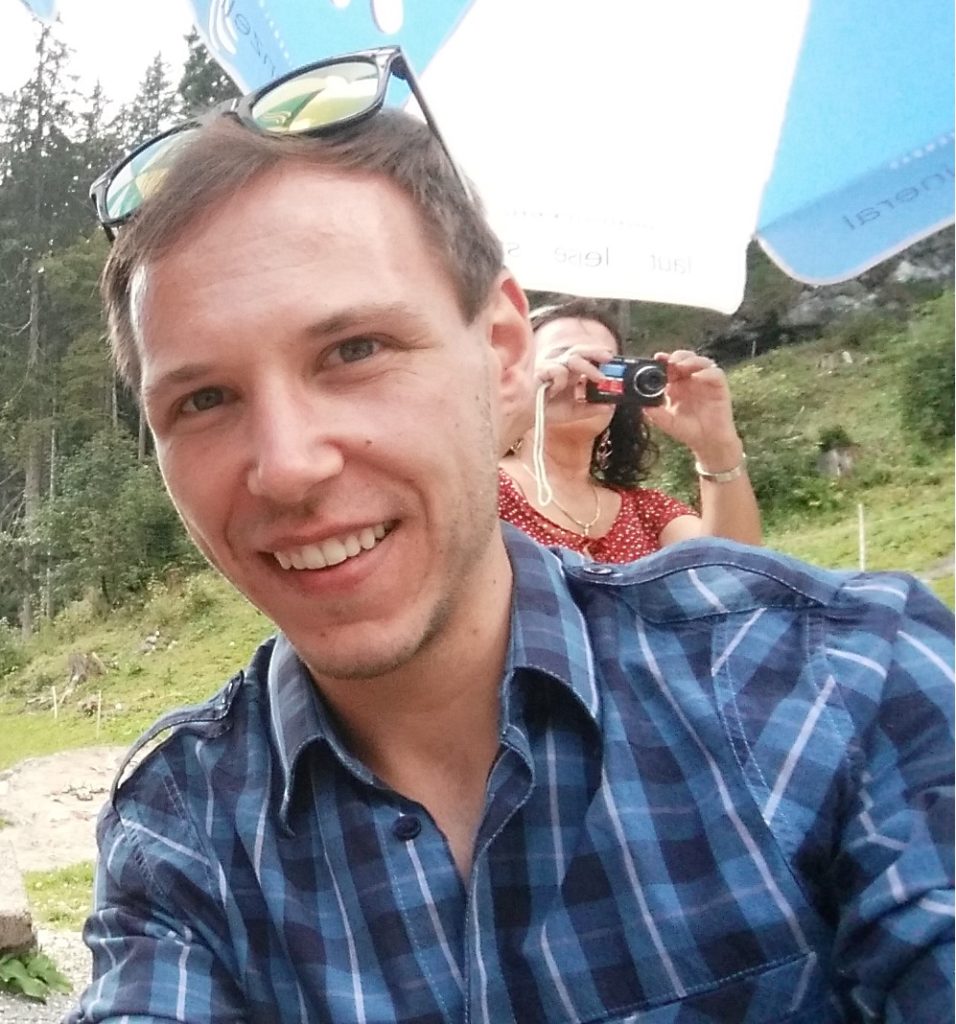
MNB: What was the topic of your PhD thesis?
CP: The official title of my thesis was ‘Disease Defence in Garden Ants’, which was necessarily vague because there was no strong, linear connection running between the chapters. For example, one chapter investigated innate immunity in founding ant queens whilst another showed that silk cocoons protect developing pupae from the acids ants disinfect their nest with. However, the bulk of my thesis was spent investigating how ants prevent successful fungal infections of the brood from becoming infectious and spreading within the colony. We found that due to changes in brood odour following infection, ants can smell when the brood are sick and so single them out for “special attention”. This involves the ants biting holes in the sick brood’s body, through which they then spray an antiseptic mix of formic and acetic acid. By disinfecting the brood in this way, from the inside out, the ants proactively kill the already doomed brood, along with the disease it carries, before the pathogen can complete its lifecycle and spread to another host.

MNB: Wow, amazing. And what is the topic of your PostDoc position? You are now working with bumblebees, right?
CP: Yes! Very broadly, we are trying to better understand the link between cognition and its effects on fitness, using bumblebees as a model system. This involves lots of behavioural assays in the lab to measure different cognitive traits – namely the various forms of memory – and seeing what the cost and benefits of these traits are under varying ecological conditions. It’s much harder work than experiments with the ants, due to the amount of time it takes to get a single replicate, but in some sense, this makes it more rewarding.
MNB: Why ants? And why bumblebees now?
CP: I have always had a strong interest in animal behaviour and entomology, having kept and bred hundreds of creepy crawlies in my bedroom as a kid. However, I was unsure exactly what I wanted to study until I was given the opportunity to do some lab experiments with ants during my final year at university. Once I started observing ants up close and seeing how much complex, social behaviour is going on inside even a small ant colony, I became hooked. However, by the end of my PhD I had studied ants and their diseases for seven years and wanted to try something a bit different. I kept an eye out for exciting positions in good research groups and also started speaking to group leaders whose work I found interesting. It just so happened that a position opened up in Dr. Elli Leadbeater’s lab that was exactly the sort of science I wanted to do, with a new model system and topic (bees and cognition). Moreover, the job was ideally located and had a start date that lined up perfectly with the end of my contract in Austria. Needless to say, I accepted the job immediately when it was offered!
MNB: Great, so everything fit together! Slightly different question now: How do you feel about field work?
CP: Although we used to call ant collection fieldwork, our study species were invasive, meaning they typically colonized disturbed urban areas. This meant we were usually collecting ants from parks, gardens, and once even a stretch of beach, in Barcelona – not exactly traditional field sites. As part of my experiments with bumblebees this summer, I spent entire days examining floral resources in the parkland surrounding our university. Again, though not exactly remote or exotic, it was nice to be outside, in the sun, on a regular basis. I would like to continue doing some sort of fieldwork in the future, but I do prefer the controlled conditions of the lab.
MNB: And how about identifying ants/bumblebees using a key?
CP: I’ve not really had a proper go at this before. So far, all of my study species have been easily identifiable by eye, especially after working with them for a while.
MNB: And how working in the wet lab?
CP: This is what I enjoy most and think I am best at. We had to be very careful not to infect our stock ant colonies with any diseases and so I developed good wet lab practices during my PhD.
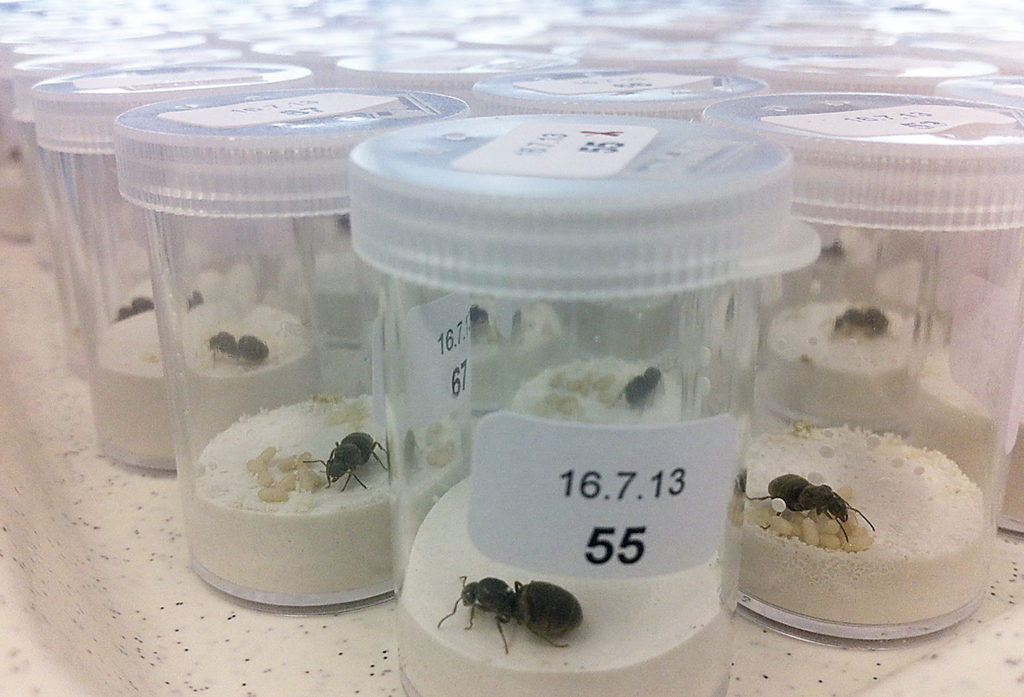
MNB: This will certainly be helpful in your research. And did you acquire your statistics knowledge in university courses, from your supervisor, or on your own?
CP: Interestingly, my college biology classes were very light on the stats, but I also took environmental science, which had the option to sit a statistics exam. This required choosing the right test and applying it to some data, all by hand. This really helped to understand how the basic tests worked and laid out the foundation for learning about statistics further at university. However, it was not until I started learning R during my PhD that I truly enjoyed statistics – there’s something about coding that makes it more understandable and intuitive, unlike black box, point-and-click software. Luckily, I was able to attend an R course early on and had lots of data with which to practice coding, and my supervisors have always been really helpful. I am now beginning to learn about information-theoretic approaches to statistical inference.
MNB: Wow! And what is the ideal frequency of meeting your supervisor for discussing your research from your point of view: daily, weekly, monthly?
CP: It really depends on the stage of the project, but I feel like once weekly to a maximum of monthly is a good amount, especially on top of weekly group lab meetings.
MNB: If you have a great idea, how do you find out if it’s really great: sitting down and thinking, discussing with your supervisor, discussing with colleagues from the group, discussing with someone not into science?
CP: I had a lot of freedom and access to resources during my PhD, so would sometimes run pilot experiments when I had what I thought was a good idea. I’d then discuss the resulting data with my supervisor and colleagues to see if it was worth perusing. In general, though, I tend to mull ideas over for quite a while, before talking about them with my peers.
MNB: That is definitely a good approach. Slightly different again: How many papers do you read in an average week?
CP: Again, this depends a bit on the stage of a project, but on average about 1-2 a week. Reading papers, or rather, feeling that I am not reading enough papers, is a constant source of anxiety. I think it would be helpful to read more as I find it’s the greatest source of inspiration for new research questions
MNB: So true. In an ideal world, is the working group you belong to small or large?
CP: All the lab groups I have belonged to have been a decent size (around 10 people), which means there’s always enough minds and spare hands to help solve problems, as well as being socially active.
MNB: And ideally, is your uni close to your field-work site or in an urban area?
CP: As much as I found it dull and boring as a kid, at my core I think I am a suburbanite. So, although I enjoy the city, I like to have a decent amount of green around. Both IST Austria and Royal Holloway have very green campuses but are close enough to major cities that things don’t get boring. The amount of parkland surrounding Royal Holloway is particularly nice, as it allows us to carry out fieldwork right on our doorstep.
MNB: That sounds nice! Have you profited more from attending conferences with narrower or with a broader scope?
CP: Having attended a lot of both, I can comfortably say I prefer smaller, narrower conferences. You can talk to everyone, and the presentations are all more or less interesting. That said, I think it is really important to attend larger conferences to broaden horizons, gain inspiration, and to just see what else is going on out of your field. At very large conferences, I try to pick a few topics I’d like to know more about (e.g. epigenetics) and attend a few of those talks to learn about something new.
MNB: What is most relevant to you at a conference: attending talks, giving a talk, meeting senior scientists, or meeting other students?
CP: I am quite shy, yet I love to give talks and posters, so this is often a priority for me. Equally important is talking to people, and especially those at a similar academic level, because they are likely to be people I will collaborate with in the future.
MNB: And if you would get 100,000 Dollar to spend for your research project, what would you do with it?
CP: I am beginning to think about fellowships for when my postdoc is finished, and so this question is constantly rolling around in my head. I think I would like to return to working with ants and probably the topic of social immunity. Over the next year, I will try and develop some of the embryonic ideas that I have, to see if I can carve out a novel niche for myself within this growing field.

MNB: Oh wow! And in your spare time, what helps you best to relax from work?
CP: Over the past year, I have become totally obsessed with two things: bouldering and houseplants. Previously lacking any interest in sports and having killed every plant I’ve ever owned, both have been a surprise. Climbing is particularly “therapeutic” when stressed – there’s just something about hanging meters off the ground by your fingertips that makes it really hard to think about anything else. Tending to the plants for an hour or so also gives me time to reflect and helps focus my thoughts.
MNB: Great hobbies! And how do you celebrate successes like getting a paper accepted, a proposal granted, or the like?
CP: When my eLife paper was accepted I was in Ikea (unable to keep from checking my emails!), and insisted that we go straight to open a bottle of champagne. I think it is very important to celebrate successes, big and small, and especially with your peers, who understand what an ordeal it can be. When my last paper was accepted, I cooked up a big meal and had the lab group over to celebrate.
MNB: That sound so nice. Do you have a personal trick to get over periods of low(er) motivation?
CP: If possible, I will try and take a break from whatever isn’t working and focus on something else for an afternoon, usually something practical in the lab. During longer stretches, I just try to enjoy things outside of work more, so that I do not continue to focus on the negative.
MNB: And relating to your recent articles: What do you do to get over frustration about what you consider as unfair criticism by a reviewer?
CP: The first paper I ever submitted came back with a whopping five reviews, which ranged from a single sentence that recommended “acceptance”, to a pages-long salvo of criticisms. I think it’s fair to say I was thrown in the deep end. It also took a while to find a journal that would send to review the ‘big project’ of my PhD, and it was not an easy road until it was accepted, requiring weeks of additional experiments whilst I was trying to finish up my PhD. This was particularly painful, not only because it was the culmination of five years of work, but also because the biggest issue was about how impactful the research was perceived to be, which can be hard to argue against. Eventually, it all turned out well, which I think was due to both persistence on my part, but also an extremely supportive supervisor who worked tirelessly to get the paper into the best journal possible. Generally, I always try to read reviews through once, not think about them too much, sleep on it, and come back to them the next day. This way I feel like I subconsciously process anything that feels personal (but of course isn’t) and I can look at the reviews more objectively.
MNB: Seems like a good approach! Is there one thing you would do differently when starting your PhD thesis again?
CP: I wish I could have published sooner. When I left Austria for my postdoc, only a review I was a co-author on had been accepted, meaning everything else was published whilst juggling moving back to the UK and starting a new job. It also meant I never really got to celebrate the papers being accepted with the people who helped and provided support on them from the beginning.
MNB: And now, would you like to stay in science?
CP: Yes, despite the odds. My current philosophy is to not think about it too much (or rather, worry too much), but to see what happens. I remember thinking I wouldn’t get a PhD, and then that I wouldn’t get a post doc. I know the next step will be harder, but I will give it my best shot, starting with fellowship applications this summer.
MNB: Good plan! And in the future, if you will be supervising PhD students yourself, what will be the most important thing you will expect from your students?
CP: Enthusiasm. I think you need that intrinsic interest in a topic or model organism to push through any trying periods.
MNB: And what will be the most important thing you will want to take care of in supervising?
CP: If I ever become a supervisor, I am worried I will be a poor communicator. I have a tendency to let emails lie when I’m unsure or short on time, rather than just tackling them head on, so this is something I want to work on.

MNB: Original article or review article?
CP: Original article.
MNB: Reading or writing?
CP: Writing.
MNB: Writing or reviewing?
CP: Writing.
MNB: Reviewing or considering criticism by someone else?
CP: Considering criticism.
MNB: The first or last 5% of time you spend with writing a manuscript?
CP: Last 5%.
MNB: Informative or sexy paper title?
CP: Informative – I’m bombarded on a daily by Google scholar alerts and so want to see straight away what a paper is about, rather than a catchy title, but this is subjective.
MNB: Table or figure?
CP: Figure.
MNB: Web of Science or Google Scholar?
CP: Google Scholar.
MNB: Journals financed by the author (open access) or the reader (subscription)?
CP: Open access.
MNB: Windows, OS, or Linux?
CP: OS.
MNB: Command-line or graphical-user interface?
CP: Graphical (except for stats!).
MNB: Mouse or touchpad?
CP: Touchpad.

MNB: Facebook or Twitter?
CP: Twitter.
MNB: Bus or bike?
CP: Bus.
MNB: Breakfast or dinner?
CP: Dinner.
MNB: Sun or rain?
CP: Sun.
MNB: Diploid or haploid?
CP: Diploid.
MNB: Sting or acid?
CP: Acid.
MNB: Social parasite or host?
CP: Social parasite.
MNB: Your favourite ant paper?
CP: It’s actually a relatively recent paper and one from a previous colleague, Simon Tragust, called “Ants disinfect fungus-exposed brood by oral uptake and spread of their poison”. I remember seeing the work being presented at a conference in the first month of my PhD and being awed by the elegant experimental approach and the completeness of the project, which definitely went on to inspire my own work.
MNB: Your favourite ant?
CP: Lasius niger
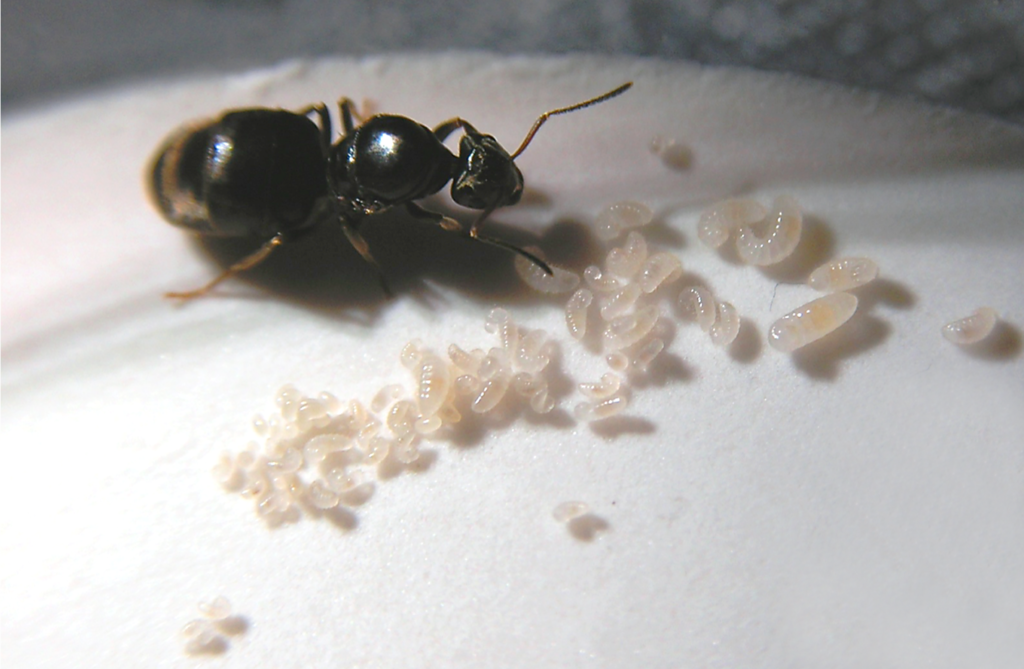
MNB: …and if in another life you would be an ant, what ant would that be?
CP: Hmm…something large and long lived, like a bullet ant or leaf-cutting ant queen.
MNB: Thank you so much for this nice interview!
In the updated version, we corrected some grammatical mistakes.




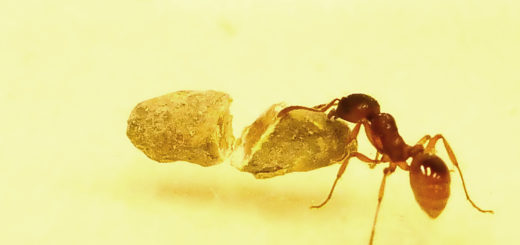
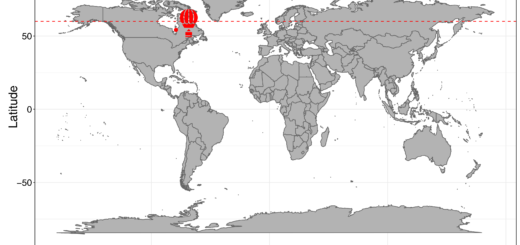
Recent Comments